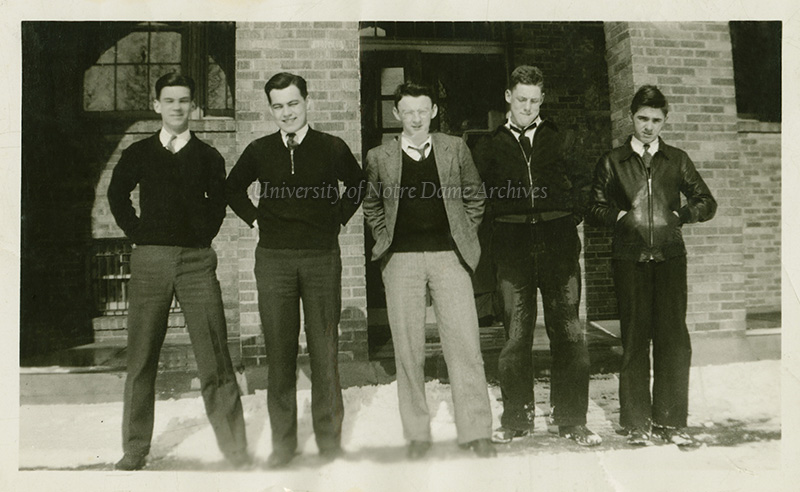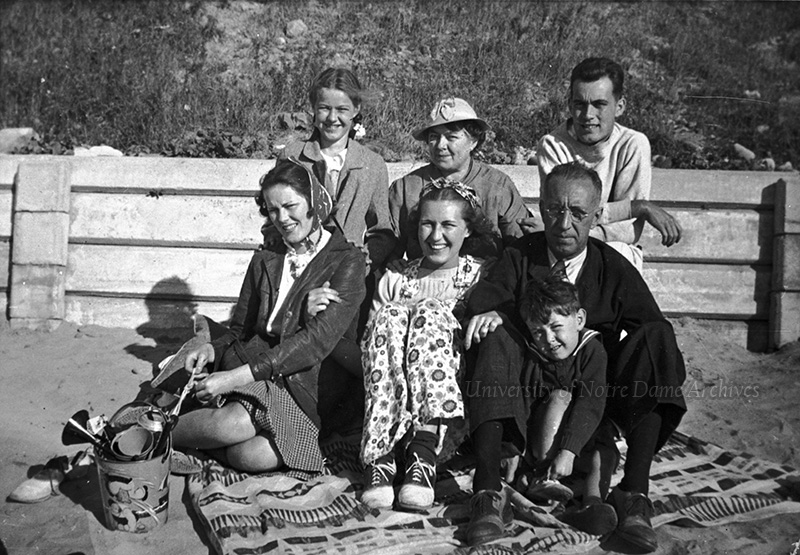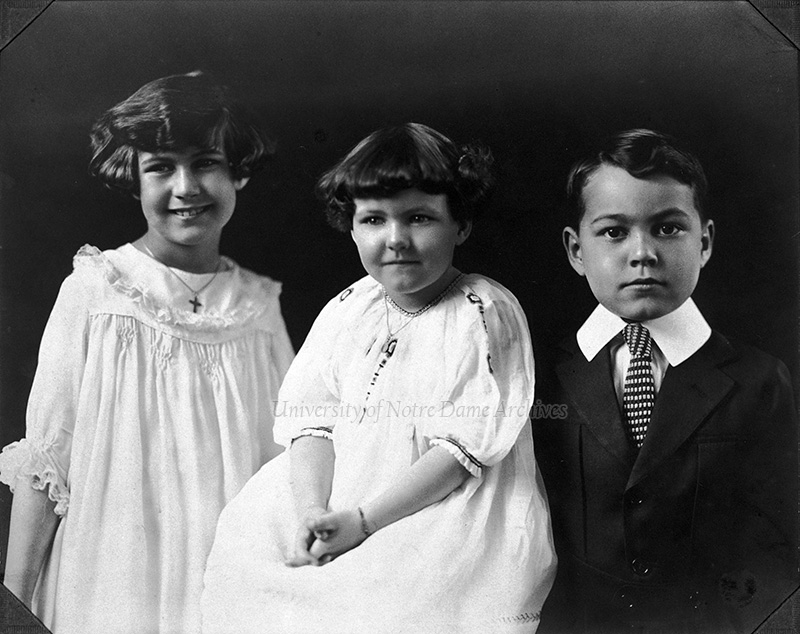 Caption
Caption
Source: University of Notre Dame Archives.
The Seminary: In the Midwest
Freshman Year
In September of 1934, Father Hesburgh, along with his parents and his sister Mary, arrived at Holy Cross Seminary. Father Hesburgh later recalled, "A world apart from what I had known before, the campus of Notre Dame was shaded by giant oaks, quiet, lovely, and awe-inspiring in a medieval sort of way."
Father Hesburgh recalled being quite homesick his first month away from home, but he soon became acclimated to life on campus.
He, as well as his fellow seminarians, took most courses at the seminary and just a few with the rest of the students, such as chemistry and life science. Father Hesburgh recalled that they were able to attend any basketball or football games they wanted. "In fact, the first Notre Dame game I saw we lost to the University of Texas." He also recalled his first Christmas away from home, "when the regular University students cheerfully left to spend the holidays with their families, and we seminarians were left behind, lonely and cold." But he remembered having a great break, during which the seminarians skated on one of the lakes and put on a Christmas play for the local community.
The following summer, after a successful freshman year, Father Hesburgh was able to go home for six weeks. At the end of his visit, he, "along with twenty-nine other novice Notre Dame seminarians and twenty other brother postulants who came from elsewhere to be Holy Cross brothers" left to spend the next year in Rolling Prairie, Indiana.
Rolling Prairie
Twenty-two miles west of Notre Dame, in Rolling Prairie, a town of about six hundred, the Congregation of Holy Cross purchased a farm and built the Saint Joseph's Novitiate. Father Hesburgh explained, "Its purpose, we learned much later, was to indoctrinate the incoming class of seminarians to the discipline and rigors of priesthood by exposing them to hard physical labor." It was a means of weeding out those who "did not have the stamina and will to stay the course."
As the second class to live and work there, they were to help get the run-down, 600-acre farm into working order. After a week-long retreat, they received their black habits. Then they met Brother Seraphim, the former German soldier who "seemed to delight in finding ways to make hard work even more difficult," and Father Healy, a Harvard graduate and gentleman, but tough priest who "considered it his sacred duty to bear down hard during the novitiate." They built a barn and silo "cement block by cement block, about fifty-five pounds apiece," cut down trees and split wood to keep the furnace going in the winter, cleared sumac and brush, collected honey from beehives without protective clothing, put in a sewer line and road, planted and harvested corn and wheat, and butchered pigs. And except for two short breaks a day, one after lunch and one after dinner, the young men spent their days in complete silence.
Despite their household chores, prayer, and studies, Father Hesburgh still had plenty of time to read. He later recalled, "I would guess I read over a hundred books in this period, most of which were on spiritual subjects, including a lot of Cardinal Newman and other classics."
Sophomore Year
Only nine of the original twenty-nine seminarians returned to Notre Dame after the year at Rolling Prairie. On August 16, 1936, Father Ted and his eight classmates made their temporary vows. They moved into Moreau Seminary on St. Joseph's Lake and continued their regular course work. Father Hesburgh later said, "Most of our time was devoted to our spiritual and intellectual development, but we also had a substantial amount of grunt work to do." Father Hesburgh was a waiter and dishwasher. "I waited tables so much during my three years at Moreau that I developed a healthy respect for the job."
Father Hesburgh also recalled many, many bells.
I rather like church bells and altar bells and musical bells of any kind. But at Moreau Seminary there were bells for starting class and ending class, bells for calling you to choir practice and to work details, bells for recreation periods, different bells for different activities from study periods to playing baseball. I grew to hate those bells as much as I disliked the amount of time we had to put in waiting tables and washing dishes, time that I thought then (and now) could have been better used for our intellectual studies. I never gave voice to those thoughts, you can be sure, because I had taken a vow of obedience, and mine was not to question my superiors.
In July following his sophomore year, Father Hesburgh, along with one of his best friends, Tom McDonagh, were told they would be studying in Rome for their doctorates in theology and philosophy for the next eight years. "When you're twenty years old, eight years is almost half your life. The thought of being away from our families that long gave both of us considerable pause." Father Hesburgh had not been home in two years. Thankfully, the young men were allowed two weeks at home.

Source: University of Notre Dame Archives.
